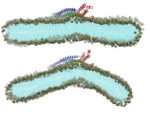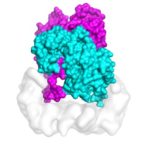The Texas Advanced Computing Center (TACC) has announced that the National Science Foundation (NSF) has extended operational funding for the Stampede2 supercomputer through June 2023. Prior to the extension, the life of the system was expected to end in September 2022. As part of the extension, 448 of the oldest Intel Knights Landing Xeon Phi […]
XSEDE Supercomputers Complete Simulations Pertinent to coronavirus, DNA Replication
Fundamental research supported by XSEDE supercomputers could help lead to new strategies and better technology that combats infectious and genetic diseases. “Chemical reactions, life, doesn’t happen that quickly,” Roston said. “It happens on a timescale of people talking to each other. Bridging this gap in timescale of many, many orders of magnitude requires many steps in your simulations. It very quickly becomes computationally intractable.”
Podcast: Simulating Galaxy Clusters with XSEDE Supercomputers
In this TACC podcast, researchers describe how they are using XSEDE supercomputers to run some of the highest resolution simulations ever of galaxy clusters. One really cool thing about simulations is that we know what’s going on everywhere inside the simulated box,” Butsky said. “We can make some synthetic observations and compare them to what we actually see in absorption spectra and then connect the dots and match the spectra that’s observed and try to understand what’s really going on in this simulated box.”
XSEDE Supercomputers Advance Skin Cancer Research
In this TACC podcast, UC Berkeley scientists describe how they are using powerful supercomputers to uncover the mechanism that activates cell mutations found in about 50 percent of melanomas. “The study’s computational challenges involved molecular dynamics simulations that modeled the protein at the atomic level, determining the forces of every atom on every other atom for a system of about 200,000 atoms at time steps of two femtoseconds.”
Podcast: Optimizing Cosmos Code on Intel Xeon Phi
In this TACC podcast, Cosmos code developer Chris Fragile joins host Jorge Salazar for a discussion on how researchers are using supercomputers to simulate the inner workings of Black holes. “For this simulation, the manycore architecture of KNL presents new challenges for researchers trying to get the best compute performance. This is a computer chip that has lots of cores compared to some of the other chips one might have interacted with on other systems,” McDougall explained. “More attention needs to be paid to the design of software to run effectively on those types of chips.”








